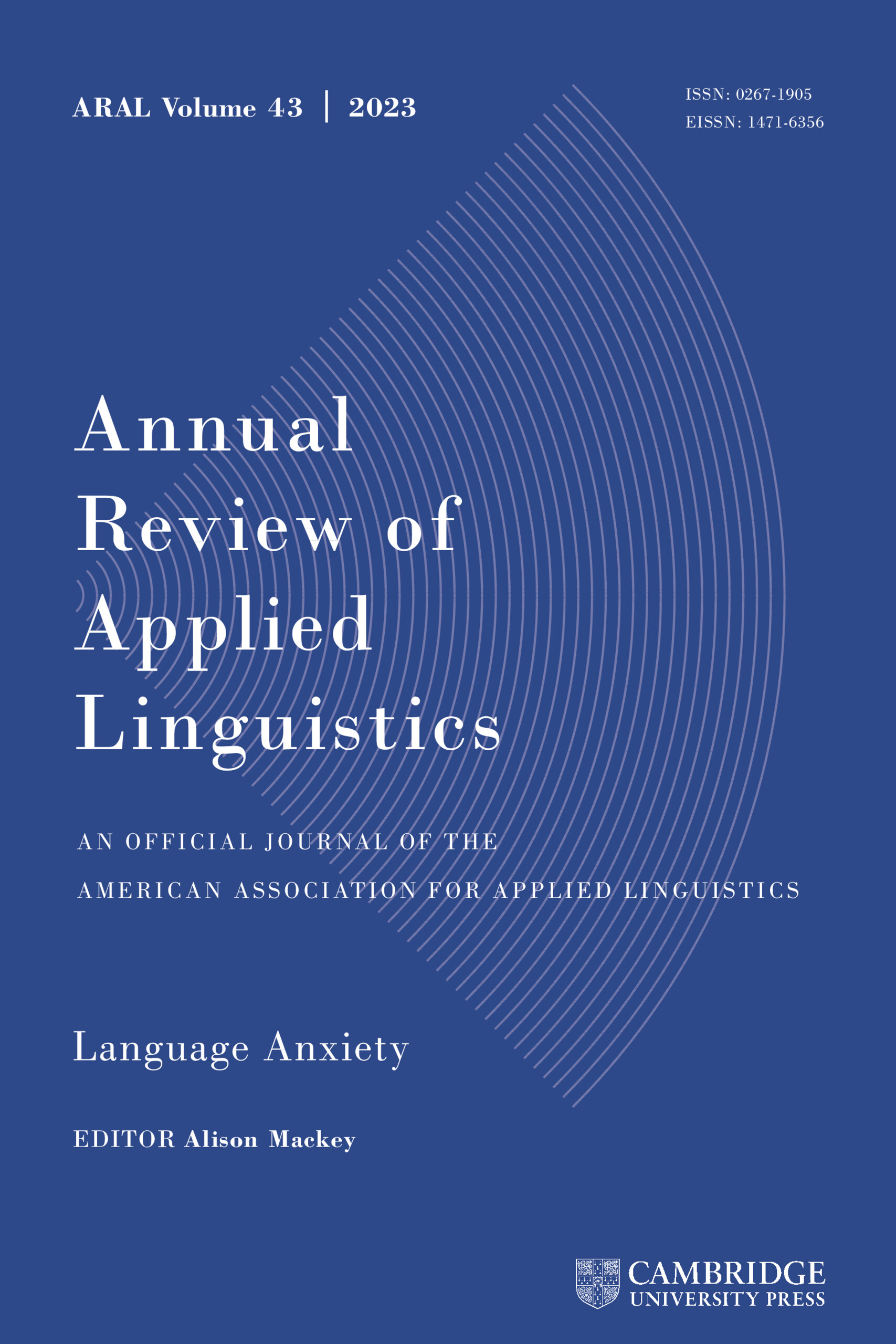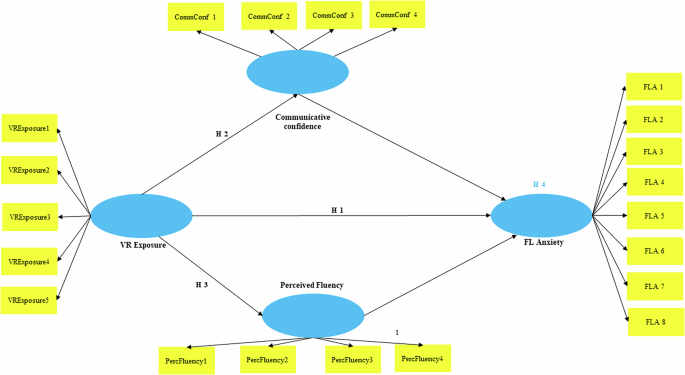On the nascency of ChatGPT in foreign language teaching and learning | Annual Review of Applied Linguistics

Appendix 1. 71 Papers on ChatGPT
Al-Garaady, J., & Mahyoob, M. (2023). ChatGPT’s capabilities in spotting and analyzing writing errors experienced by EFL learners. Arab World English Journals, Special Issue on CALL, (9).
Al-khresheh, M. H. (2024). Bridging technology and pedagogy from a global lens: Teachers’ perspectives on integrating ChatGPT in English language teaching. Computers and Education: Artificial Intelligence, 6, 100218.
Al-Obaydi, L. H., Pikhart, M., & Klimova, B. (2023). ChatGPT and the general concepts of education: Can artificial intelligence-driven chatbots support the process of language learning?. International Journal of Emerging Technologies in Learning, 18(21), 39‒50.
Ali, J. K. M., Shamsan, M. A. A., Hezam, T. A., & Mohammed, A. A. (2023). Impact of ChatGPT on learning motivation: teachers and students’ voices. Journal of English Studies in Arabia Felix, 2(1), 41‒49.
Allehyani, S. H., & Algamdi, M. A. (2023). Digital competences: early childhood teachers’ beliefs and perceptions of ChatGPT application in teaching English as a second language (ESL). International journal of learning, teaching and educational research, 22(11), 343‒363.
Athanassopoulos, S., Manoli, P., Gouvi, M., Lavidas, K., & Komis, V. (2023). The use of ChatGPT as a learning tool to improve foreign language writing in a multilingual and multicultural classroom. Advances in Mobile Learning Educational Research, 3(2), 818‒824.
Ausat, A. M. A., Massang, B., Efendi, M., Nofirman, N., & Riady, Y. (2023). Can chat GPT replace the role of the teacher in the classroom: A fundamental analysis. Journal on Education, 5(4), 16100‒16106.
Barrot, J. S. (2023). Using ChatGPT for second language writing: Pitfalls and potentials. Assessing Writing, 57, 100745.
Barrot, J. S. (2024). ChatGPT as a language learning tool: An emerging technology report. Technology, Knowledge and Learning, 29(2), 1151‒1156.
Baskara, F. R. (2023a). ChatGPT-assisted English language learning: Theoretical implications for global mobility and cross-cultural communication. In Proceedings of the 2nd International Conference on Language and Language Teaching (InCoLLT) 2023 (pp. 105‒120). Surabaya, Indonesia.
Baskara, F. R. (2023b). Integrating ChatGPT into EFL writing instruction: Benefits and challenges. International Journal of Education and Learning, 5(1), 44‒55.
Baskara, R. (2023). Exploring the implications of ChatGPT for language learning in higher education. Indonesian Journal of English Language Teaching and Applied Linguistics, 7(2), 343‒358.
Bin-Hady, W. R. A., Al-Kadi, A., Hazaea, A., & Ali, J. K. M. (2023). Exploring the dimensions of ChatGPT in English language learning: A global perspective. Library Hi Tech.
Bonner, E., Lege, R., & Frazier, E. (2023). Large Language Model-Based Artificial Intelligence in the Language Classroom: Practical Ideas for Teaching. Teaching English with Technology, 23(1), 23‒41.
Cai, Q., Lin, Y., & Yu, Z. (2024). Factors influencing learner attitudes towards ChatGPT-assisted language learning in higher education. International Journal of Human–Computer Interaction, 40(22), 7112‒7126.
Derakhshan, A., & Ghiasvand, F. (2024). Is ChatGPT an evil or an angel for second language education and research? A phenomenographic study of research‐active EFL teachers’ perceptions. International Journal of Applied Linguistics, 34(4), 1246‒1264.
Dong, L. (2024). “Brave New World” or not? A mixed-methods study of the relationship between second language writing learners’ perceptions of ChatGPT, behaviors of using ChatGPT, and writing proficiency. Current Psychology, 43(21), 19481‒19495.
Gao, Y., Wang, Q., & Wang, X. (2024). Exploring EFL university teachers’ beliefs in integrating ChatGPT and other large language models in language education: a study in China. Asia Pacific Journal of Education, 44(1), 29‒44.
Ghafar, Z. N. (2023). ChatGPT: a new tool to improve teaching and evaluation of second and foreign languages a review of ChatGPT: the future of education. International Journal of Applied Research and Sustainable Science, 1(2), 73‒86.
Han, Z-H. (2024). Chatgpt in and for second language acquisition: a call for systematic research. Studies in Second Language Acquisition, 46(2), 301‒306.
Handley, Z. L. (2024). Has artificial intelligence rendered language teaching obsolete? The Modern Language Journal, 108(2), 548‒555.
Har, F. (2023, December). Teaching English as a second language in the midst of a paradigm shift: An exploration of students’ and teachers’ perception of ChatGPT. In Critical Reflections on ICT and Education: Selected Papers from the HKAECT 2023 International Conference (pp. 21‒35). Singapore: Springer Nature Singapore.
Hayashi, K., & Sato, T. (2024). The effectiveness of ChatGPT in enhancing English language proficiency and reducing second language anxiety (L2). In WorldCALL2023: Official Conference Proceedings (pp. 201‒208).
Hong, W. C. H. (2023). The impact of ChatGPT on foreign language teaching and learning: Opportunities in education and research. Journal of Educational Technology and Innovation, 5(1).
Javier, D. R. C., & Moorhouse, B. L. (2023). Developing secondary school English language learners’ productive and critical use of ChatGPT. TESOL Journal, 15(2), e755.
Jeon, J., & Lee, S. (2023). Large language models in education: A focus on the complementary relationship between human teachers and ChatGPT. Education and Information Technologies, 28(12), 15873‒15892.
Jiang, Z., Xu, Z., Pan, Z., He, J., & Xie, K. (2023). Exploring the role of artificial intelligence in facilitating assessment of writing performance in second language learning. Languages, 8(4), 247.
Kern, R. (2024). Twenty‐first century technologies and language education: Charting a path forward. The Modern Language Journal, 108(2), 515‒533.
Kim, S., Shim, J., & Shim, J. (2023). A study on the utilization of OpenAI ChatGPT as a second language learning tool. Journal of Multimedia Information System, 10(1), 79‒88.
Kohnke, L., Moorhouse, B. L., & Zou, D. (2023). ChatGPT for language teaching and learning. RELC Journal, 54(2), 537‒550.
Koraishi, O. (2023). Teaching English in the age of AI: Embracing ChatGPT to optimize EFL materials and assessment. Language Education and Technology, 3(1), 55‒72.
Kostka, I., & Toncelli, R. (2023). Exploring applications of ChatGPT to English language teaching: Opportunities, challenges, and recommendations. Tesl-Ej, 27(3), n3.
Kucuk, T. (2024). ChatGPT integrated grammar teaching and learning in EFL classes: A Study on Tishk International University Students in Erbil, Iraq. Arab World English Journal, 1(1), 100–111.
Law, L. (2024). Application of generative artificial intelligence (GenAI) in language teaching and learning: A scoping literature review. Computers and Education Open, 6(2), 100174.
Li, B., Bonk, C. J., & Kou, X. (2023). Exploring the multilingual applications of ChatGPT: Uncovering language learning affordances in YouTuber videos. International Journal of Computer-Assisted Language Learning and Teaching, 13(1), 1‒22.
Li, B., Kou, X., & Bonk, C. J. (2023). Embracing the disrupted language teaching and learning field: Analyzing YouTube content creation related to ChatGPT. Languages, 8(3), 197.
Li, J., Ren, X., Jiang, X., & Chen, C. H. (2023). Exploring the Use of ChatGPT in Chinese Language Classrooms. International Journal of Chinese Language Teaching, 4(3), 36‒55.
Li, Q., Zhang, J., & Cai, W. (2024). Utilizing ChatGPT to Implement Differentiated Instruction. International Journal of Chinese Language Teaching, 5(1), 74‒89.
Li, X., Li, B., & Cho, S. J. (2023). Empowering Chinese language learners from low-income families to improve their Chinese writing with ChatGPT’s assistance afterschool. Languages, 8(4), 238.
Liang, J., Wang, L., Luo, J., Yan, Y., & Fan, C. (2023). The relationship between student interaction with generative artificial intelligence and learning achievement: serial mediating roles of self-efficacy and cognitive engagement. Frontiers in Psychology, 14, 1285392.
Liu, G., & Ma, C. (2024). Measuring EFL learners’ use of ChatGPT in informal digital learning of English based on the technology acceptance model. Innovation in Language Learning and Teaching, 18(2), 125‒138.
Liu, Y., He, S., Chen, H., Qing, W., Su, H., & Deng, G. (2023). Investigation on response strategies for the impact of ChatGPT technology application on college Chinese language education. International Journal of Educational Innovation and Science, 4(1), 156‒164.
Mabuan, R. A. (2024). ChatGPT and ELT: Exploring teachers’ voices. International Journal of Technology in Education, 7(1), 128‒153.
Mahapatra, S. (2024). Impact of ChatGPT on ESL students’ academic writing skills: a mixed methods intervention study. Smart Learning Environments, 11(1), 9.
Marzuki, Widiati, U., Rusdin, D., Darwin, & Indrawati, I. (2023). The impact of AI writing tools on the content and organization of students’ writing: EFL teachers’ perspective. Cogent Education, 10(2), 2236469.
Meniado, J. C. (2023). The Impact of ChatGPT on English Language Teaching, Learning, and Assessment: A Rapid Review of Literature. Arab World English Journal, 14(4), 3‒18.
Mohamed, A. M. (2024). Exploring the potential of an AI-based Chatbot (ChatGPT) in enhancing English as a Foreign Language (EFL) teaching: perceptions of EFL Faculty Members. Education and Information Technologies, 29(3), 3195‒3217.
Moqbel, M. S. S., & Al-Kadi, A. M. T. (2023). Foreign language learning assessment in the age of ChatGPT: A theoretical account. Journal of English Studies in Arabia Felix, 2(1), 71‒84.
Mousazadeh, M. (2023). Explanations from ChatGPT: Targeted task improvements but no generalized gains in metacognitive abilities for novice language learners. Research Square.
Muñoz-Basols, J., Neville, C., Lafford, B. A., & Godev, C. (2023). Potentialities of applied translation for language learning in the era of artificial intelligence. Hispania, 106(2), 171‒194.
Pack, A., & Maloney, J. (2023). Potential affordances of generative ai in language education: Demonstrations and an evaluative framework. Teaching English with Technology, 23(2), 4‒24.
Pérez-Núñez, A. (2023). Exploring the potential of generative AI (ChatGPT) for foreign language instruction: applications and challenges. Hispania, 106(3), 355‒362.
Pfau, A., Polio, C., & Xu, Y. (2023). Exploring the potential of ChatGPT in assessing L2 writing accuracy for research purposes. Research Methods in Applied Linguistics, 2(3), 100083.
Rakhmonov, I. U., & Kurbonova, R. S. (2023). The pedagogical principles and effectiveness of utilizing ChatGPT for language learning. Research and Education, 2(9), 226‒243.
Sakai, N. (2023). Native, non-native, or bilingual? A concise assessment of ChatGPT’s suitability for second-language instruction as a native or non-native Pedagogue. OSF Preprints.
Saville, N. (2023). The future of language learning in the era of ChatGPT. Journal of e-Learning and Knowledge Society, 19(3), 6‒10.
Schmidt-Fajlik, R. (2023). ChatGPT as a grammar checker for Japanese English language learners: A comparison with Grammarly and ProWritingAid. AsiaCALL Online Journal, 14(1), 105‒119.
Shaikh, S., Yayilgan, S. Y., Klimova, B., & Pikhart, M. (2023). Assessing the usability of ChatGPT for formal english language learning. European Journal of Investigation in Health, Psychology and Education, 13(9), 1937‒1960.
Söğüt, S. (2024). Generative artificial Intelligence in EFL writing: A pedagogical stance of pre-service teachers and teacher trainers. Focus on ELT Journal, 6(1), 58‒73.
Strobl, C., Menke-Bazhutkina, I., Abel, N., & Michel, M. (2024). Adopting ChatGPT as a writing buddy in the advanced L2 writing class. Technology in Language Teaching & Learning, 6(1), 1‒19.
Thorne, S. L. (2024). Generative artificial intelligence, co-evolution, and language education. Modern Language Journal, 108(2), 567‒572.
Topal, İ. H. (2024). ChatGPT: A critical evaluation: openai. com. TESOL Journal, 15(3), e810.
Tseng, W., & Warschauer, M. (2023). AI-writing tools in education: If you can’t beat them, join them. Journal of China Computer-Assisted Language Learning, 3(2), 258‒262.
Ulla, M. B., Perales, W. F., & Busbus, S. O. (2023). ‘To generate or stop generating response’: Exploring EFL teachers’ perspectives on ChatGPT in English language teaching in Thailand. Learning: Research and Practice, 9(2), 168‒182.
Warschauer, M., Tseng, W., Yim, S., Webster, T., Jacob, S., Du, Q., & Tate, T. (2023). The affordances and contradictions of AI-generated text for writers of English as a second or foreign language. Journal of Second Language Writing, 62.
Xiao, F., Liu, G., Yu, Y., Wang, H., & Wang-Bramlett, D. (2023). ChatGPT and Chinese teaching. Studies in Chinese Learning and Teaching, 8, 1‒13.
Xiao, Y., & Zhi, Y. (2023). An exploratory study of EFL learners’ use of ChatGPT for language learning tasks: Experience and perceptions. Languages, 8(3), 212.
Yan, D. (2023). Impact of ChatGPT on learners in a L2 writing practicum: An exploratory investigation. Education and Information Technologies, 28(11), 13943‒13967.
Young, J. C., & Shishido, M. (2023). Investigating OpenAI’s ChatGPT potentials in generating Chatbot’s dialogue for English as a foreign language learning. International journal of advanced computer science and applications, 14(6).
Zadorozhnyy, A., & Lai, W. Y. W. (2023). ChatGPT and L2 Written Communication: A Game-Changer or Just Another Tool? Languages, 9(1), 5.
Zhou, T., Cao, S., Zhou, S., Zhang, Y., & He, A. (2023). Chinese intermediate English learners outdid ChatGPT in deep cohesion: Evidence from English narrative writing. System, 118, 103141.
link







